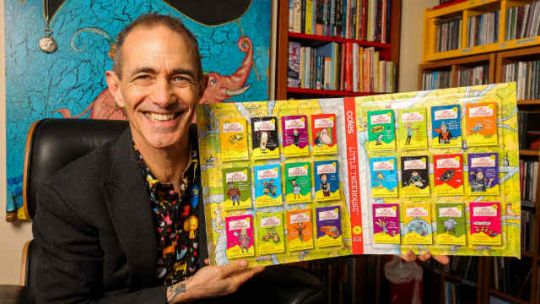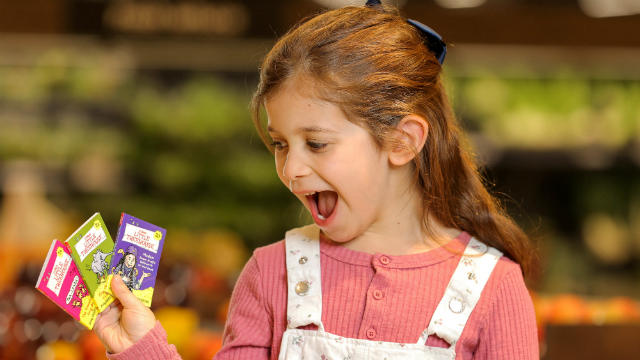Will customers buy into Coles' new Little Treehouse collectables in the midst of a pandemic?

Coles has shelved its plastic mini collectables in favour of a new campaign, featuring pocket-sized children’s books. But, will it help to supercharge the supermarket’s sales, or will the impact be more subdued due to the effects of COVID-19? One expert has described the timing as “perplexing”.
Supermarket giant Coles today kicked off its new collectable campaign, giving customers the chance to take home a pocket-sized Little Treehouse book for every $30 they spend in one transaction at Coles supermarkets, Coles Express and Coles Online.
Coles has partnered with popular Australian children’s author Andy Griffiths and illustrator Terry Denton to create 24 Coles Little Treehouse books to collect. These books are inspired by the much-loved characters from the original Treehouse book series and also include new titles such as Jill’s Little Big Book of Animals, Vegetable Patty and Elephant on a Bicycle.
In addition to the 24 regular Treehouse books available, there are also an additional three rare ‘Fluro’ books to collect and the ‘super rare’ Golden Treehouse Tour books (only 100 available).
Coles’ chief marketing officer, Lisa Ronson, said this new campaign was a way to help entertain children and improve their reading skills.
“Our research found that while 83% of Australian households frequently encourage children to read, only 22% frequently purchased books for kids to read,” Ms Ronson said.
But how will this new campaign be received during the pandemic?
Canstar money expert Effie Zahos said the timing of this campaign launching in the midst of the pandemic was “perplexing”.
“These collectables are mainly about bolstering sales for the supermarket, but given there is already a high demand for grocery shopping during the pandemic, it’s unclear as to why Coles needs to give people an added incentive to come into its stores right now,” she said.
Recent Australian Bureau of Statistics (ABS) preliminary data showed that retail spending rose by 2.4% in June, following a massive 16.9% jump in May.
A significant part of that May rise was made up of grocery sales, which Ms Zahos said would continue to drive household spending, particularly while stockpiling was still occuring.
“With a lockdown now in place in Melbourne and fears of one in New South Wales, a lot of people in these two biggest economies will be going back into that stay-at-home mentality, where they will be cooking at home more and therefore spending more on groceries,” Ms Zahos said.
“Because of that, supermarkets like Coles will be getting huge sales already, so why do they need to push us through the door with this new campaign?
“It may be about growing a bigger market share, but the answer is unclear.”
Ms Zahos said it would be interesting to see whether this new collectables campaign will change people’s behaviour about choosing to go to Coles over another grocery store.
“While these collectables will play on the hearts of Mums and Dads, because we all want our kids to be reading books, our wallets are tight at the moment, so the price available for certain goods may go more into determining where we shop now than it has before,” she said.
Ms Zahos added that people also tended to go to grocery stores they are familiar with during a pandemic, as it can help provide an added feeling of security.
“Ultimately it will take some time to see whether this campaign will have the same success in generating extra sales for Coles as its predecessors,” she said.
“But consumers should be wary about letting these collectables drive their decision-making when it comes to spending more in store.”
Are these new collectables environmentally-friendly?
Ms Zahos said it appeared Coles had taken on board feedback from its last two collectable campaigns, including criticism about the environmental impact of the plastic used.
Coles’ previous Little Shop and Stikeez-collectable campaigns, which offered miniature plastic versions of products and plastic fruit and vegetable figurines, proved to be fairly successful in bolstering sales for the supermarket.
However, both campaigns came under fire from consumers for contributing to plastic pollution and waste, especially while the supermarket was trying to improve its environmental reputation by phasing out single-use plastic bags.
Perhaps in response to this backlash, Coles said the paper and packaging used to produce the new Treehouse book collectables was responsibly sourced and could be recycled at home like any paper product.
“As a mother myself, I would much prefer my kids to read than to play with a piece of plastic or their Xbox,” Ms Zahos said.

In addition to the new collectables campaign, Coles has also launched a picture storybook competition today, encouraging Aussie kids to get creative and develop their own fictional books, with various prizes to be won for students and their schools.
With every entry into the storybook competition, Coles has said it will also donate a book to a remote Indigenous community.
This article was reviewed by our Sub-editor Tom Letts before it was published as part of our fact-checking process.
The comparison table below shows some of the Savings Accounts on Canstar’s database for a regular saver in NSW with links to the providers’ websites. The results shown are based on an investment of $100,000 in a personal savings account and are sorted by Star Rating (highest to lowest), then provider name (alphabetically). For more information and to confirm whether a particular product will be suitable for you, check upfront with your provider and read the Product Disclosure Statement before making a decision.
Follow Canstar on Facebook and X for regular financial updates.







